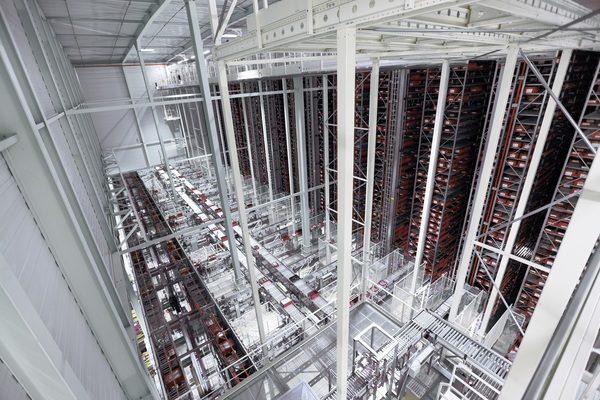Upload your press release
Spare Parts Logistics: Advantage Through Preparation

Climate change has driven the automotive market towards the use of alternative drives. Soon, this will also have consequences for the spare parts market and its logistics. TGW Logistics Group recommends that companies create the conditions for this new era now with automation and digitalization. Powerful technologies are available for a future that is increasingly hard to predict.
At the moment, most cars in Germany have a combustion engine, but about 14 percent of the vehicles newly registered in 2021 have an all-electric drive—almost doubling the share of electric vehicles from the previous year. Electric, hybrid, and hydrogen vehicles present car manufacturers and suppliers with enormous challenges: from program planning and the scheduling of production orders to an impending decrease in spare parts orders. Some manufacturers and dealers have been making up to 70 percent of their profits this way.
FEWER PARTS, LESS LOGISTICS?
The triumph of electric vehicles leads to a reduction in spare part sales because a combustion engine consists of more than 1,400 components, while an electric motor has only about 200. Electric cars also require fewer repairs on average because they are constructed differently. However, fewer motor parts do not mean fewer logistics activities, at least in the medium-term. One reason is that cars in Europe are on average nine years old, which means that spare parts for electric cars sold today won’t be needed for several years, and until then, spare parts for combustion engines will continue to dominate the market. Another reason is current after-sales logistics are more complex than even a decade ago because of this parallel world of combustion engines, hybrid drives, and electric models. Parts for diesel- and gasoline-powered vehicles will still need to be stocked for a long time: many original equipment manufacturers (OEM) keep them in stock for ten to fifteen years after the end of production.
A high degree of unpredictability is another aspect that makes this topic complex. Zero-emissions does not mean zero problems. Many unanswered questions unsettle manufacturers and customers alike. Where will problems for the procurement of raw materials for battery production arise? How is recycling going to be regulated? These are only two of many questions. Additionally, it is currently unclear what market share fossil fuels, e-fuels, LPG, hydrogen, and electricity will have in the next decade or two.
DIGITALIZATION AND AUTOMATION AS KEY FACTORS
Developments that are difficult to predict, more complex business deals, new services—experts agree that this situation can only be resolved with automation and digitalization. Admittedly, the market will not change overnight, but sitting back and waiting is the wrong strategy. In only three to four years, spare parts for hybrid models will be needed, which means, given the realization time of large automation projects, companies have little time to waste. Additionally, digitalization allows companies to launch retail platforms in the blink of an eye. If you cannot maintain your service level with competitors, you will lose customers. Winning them back is hard. Quality service and fast delivery are still the be-all and end-all in this business, which is why high availability and agile logistics are more important than ever for manufacturers and dealers.
LABOR SHORTAGE DRIVES DEVELOPMENT
Another argument for automation is the increasing labor shortage. The situation will continue to become even more difficult because demographic changes cannot be stopped. A high degree of automation helps companies to prepare for uncertain times.
HIGH SERVICE LEVEL, FAST DELIVERY
TGW continually keeps a close eye on these industry developments and ensures that their findings are incorporated into their solutions. The best of the best in the market have already established a global logistics network, digital processes, and structured inventory management—winning over customers with a high service level and fast delivery.
With FlashPick®, TGW has a system in its portfolio that allows companies to adapt flexibly to different scenarios and provides answers for the most important questions around efficiency and profitability. FlashPick® is all about reacting to fluctuations in demand, expectations for a high service level, and shortages in labor. In practice, this means, compared to other systems, express orders can be integrated into the daily business without problem. Only a few minutes pass from electronic order intake to the package being ready to ship.
DIGITAL MAINTENANCE OF AUTOMATED WAREHOUSE SYSTEMS
For maintenance and support, TGW uses modern tools such as data glasses that provide employees in the installation with information via a live stream. The digital maintenance management CMMS is state-of-the-art. Condition-based monitoring is also used, meaning sensors are used to acquire status data for important components and compared to the empirical values in a centralized database. Maintenance models are then developed based on this data.
Furthermore, TGW is working on making the handling of slow-moving items more efficient by using the latest technology. These solutions are also very important for value added services, offering users the highest degree of flexibility.
In conclusion, the same principle applies to spare parts businesses and TGW: if you are prepared, you have an advantage.
https://www.tgw-group.com/us/news/press-releases/2022/spare-parts-logistics-advantage-through-preparationRelated Articles
Copyright ©2024. All Rights ReservedDesign, CMS, Hosting & Web Development :: ePublishing